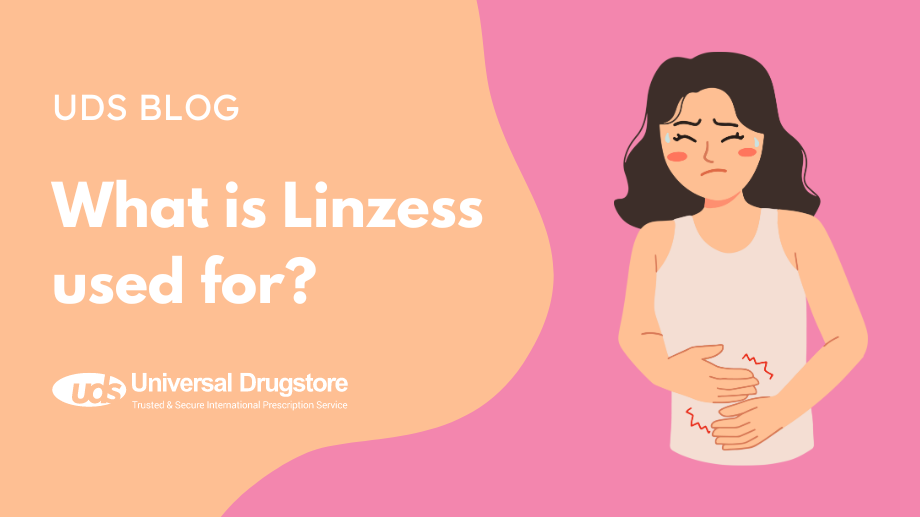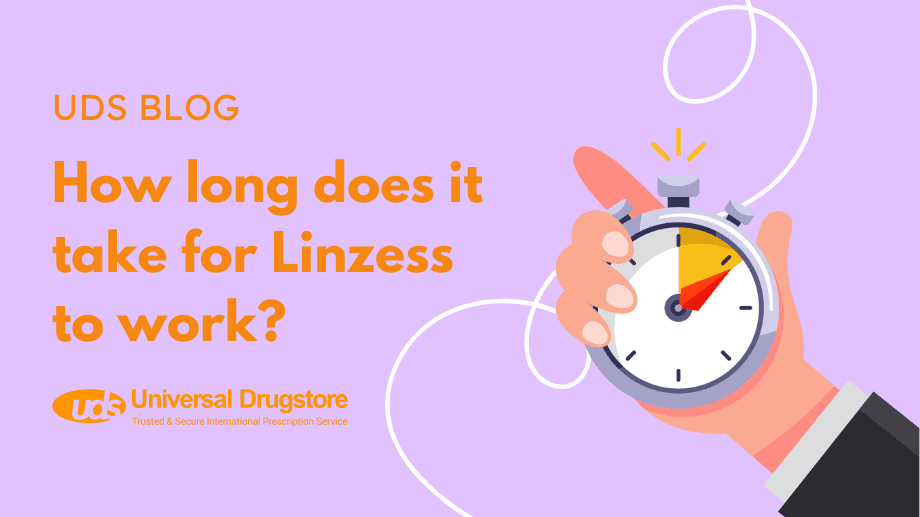What is Linzess used for?

Linzess (linaclotide, pronounced [LIN-a-KLOE-tide]) is a brand-name prescription medication that is FDA-approved to treat the following digestive conditions in adults:
- Irritable bowel syndrome with constipation (IBS-C): A chronic gastrointestinal disorder that can cause abdominal pain, bloating, and infrequent, difficult-to-pass stools. Symptoms may temporarily improve after a bowel movement but often return.
- Chronic idiopathic constipation (CIC): A long-term condition where constipation occurs for no known reason. Common in women and older adults.
Linzess is also approved for children 6 years of age and older with:
- Functional constipation (FC): A common issue among children and older adults, characterized by fewer than three bowel movements per week. Causes include diet, low activity, toilet habits, medications, and family history.
How does Linzess work?
Linaclotide, the active ingredient in Linzess, is a guanylate cyclase-C agonist (GC-C agonist). It increases secretion of chloride and water in the intestines to soften stool and promote bowel movements. It also reduces intestinal pain-sensing nerve sensitivity to relieve discomfort.
What is the recommended dosage for Linzess?
Dosage depends on the condition being treated:
Adults
- IBS-C: 290 mcg by mouth once daily
- CIC: 72 mcg or 145 mcg by mouth once daily
Children (6–17 years)
- FC: 72 mcg by mouth once daily
How should you take Linzess?
Follow your healthcare provider’s instructions and read all FDA-approved labeling. Take Linzess:
- On an empty stomach, at least 30 minutes before your first meal
- At the same time daily
- Whole — do not crush or chew capsules
If you have trouble swallowing or use a feeding tube, consult your provider about mixing the capsule contents with applesauce or water.
If you miss a dose, skip it and take your next dose as scheduled. Do not double up.
What are the side effects of Linzess?
Most common side effects:
- Bloating
- Diarrhea
- Flatulence
- Stomach pain
Shop Medications
Other possible side effects:
- Headache
- Nausea
- Vomiting
- Indigestion
- Urgent need to defecate
- Inability to control bowel movements
- Infections (respiratory, sinus, stomach flu)
Serious side effects:
- Severe allergic reactions (hives, facial swelling, breathing trouble)
- Life-threatening dehydration in children under 2 years (do not use)
- Severe diarrhea leading to hospitalization
Seek emergency help if serious reactions occur. These are not all possible side effects. Report side effects to AbbVie at 1-800-678-1605 or to the FDA at www.fda.gov/medwatch or 1-800-FDA-1088.
Are there any drug interactions with Linzess?
No known interactions are currently listed. Still, tell your healthcare provider about all medications, vitamins, and supplements you take before starting Linzess.
Is there a Boxed Warning with Linzess?
Yes. Linzess carries a warning due to the risk of serious dehydration in children under 2 years of age. It should not be used in this age group.
What should you tell your healthcare provider before taking Linzess?
Inform your provider if you have any of the following:
- Bowel blockage
- Allergies to ingredients in Linzess
- Pregnancy or plans to become pregnant (effects are unknown)
- Breastfeeding or plans to breastfeed (not found in breast milk but discuss risks and benefits)
How do you store Linzess?
Store at 68°F to 77°F (20°C to 25°C), away from heat and moisture. Keep capsules in original container and out of children’s reach.
Is Linzess a laxative?
Linzess is not a traditional laxative. While it helps relieve constipation symptoms, it works differently by:
- Increasing fluid in the intestines to soften stool
- Stimulating bowel movements
- Reducing intestinal pain sensitivity
Linzess is intended for long-term use, unlike short-term laxatives.
Related medications
- Trulance (plecanatide)
- Amitiza (lubiprostone)
- Ibsrela (tenapanor)
- Motegrity (prucalopride)
- Miralax (polyethylene glycol 3350)
Sources
- Allen P, Setya A, Lawrence VN. Pediatric Functional Constipation. StatPearls. Accessed July 15, 2024.
- Thomas RH, Allmond K. Linaclotide (Linzess) for IBS-C and CIC. P T. 2013 Mar;38(3):154-60. Accessed July 15, 2024.
- Linzess (linaclotide) capsules. FDA. Accessed July 15, 2024.
- Linaclotide (Rx). Medscape. Accessed July 15, 2024.
- Lacy BE, et al. ACG Clinical Guideline: Management of IBS. Am J Gastroenterol. 2021;116(1):17-44. Accessed July 15, 2024.




